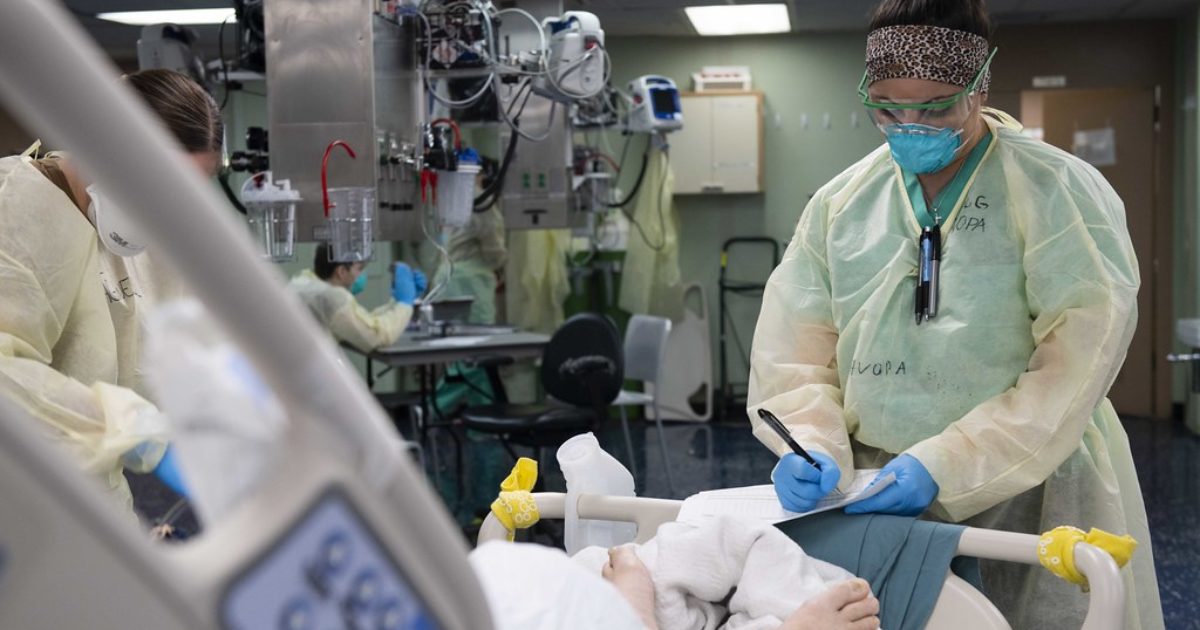Shocking reports from Quebec, Canada reveal rampant medical malpractice in nursing homes.
A recent coroner’s inquest shows one Quebec nursing home opted to use morphine instead of treating patients stricken with COVID-19.
Instead of prolonging life to the best of their ability, the long-term care facility staff was ordered to place patients on morphine.
And the results were catastrophic.
Most patients in the nursing home passed away.
Check it out:
How is this NOT the LARGEST story in Canada?
"Quebec nursing home often gave morphine rather than treat COVID-19 patients, inquest told"https://t.co/I4TwVy07jA pic.twitter.com/EksxDxzA2M
— Marie Oakes (@TheMarieOakes) July 19, 2021
"A nurse testified that the Sainte-Dorothée long-term care facility consistently administered morphine instead of attempting to prolong the life of elderly residents who were believed to have COVID-19." https://t.co/2a8Pl69gEx
— Vaccine Choice Canada (@VaccineChoiceCA) July 21, 2021
We need some answers, was this done across Canada? #canada @cdnpoli https://t.co/OEsOgFF8Cd
— Common People Party of Canada (@common_canada) July 19, 2021
The UK used midazolam to murder seniors.
Now the truth is coming out about Canada.
Quebec nursing home often gave morphine rather than treat COVID-19 patients, inquest told – The Globe and Mail https://t.co/NW1q4Or7b5
— Ian Prittie (@thereds8) July 19, 2021
While part of this will be attributed to the lack of COVID-19 knowledge at that time, it should mostly fall under medical malpractice.
Because safe and effective treatments have been censored for well over a year now.
But don’t expect hospital executives or government officials to be sued, prosecuted, or jailed for these disastrous policies.
Dr. Vladimir Zelenko should have been followed in March 2020 by everyone. Brian and I certainly did so with life saving results. https://t.co/tY6EgeRuKm
— Dr. George Fareed (@GeorgeFareed2) July 19, 2021
Dr. Vladimir Zelenko, the New York doctor who pioneered the use of hydroxychloroquine (HCQ) and zinc as treatment for COVID-19, gave a lengthy interview to LifeSiteNews explaining why this protocol has been so successful.
— Patriot Forever (@PatriotForeve11) July 11, 2021
https://www.youtube.com/watch?v=EVQD2QmzeHI
Ivermectin seems to have saved India from delta variant?
Can someone explain otherwise why such massive drop with low vaccination rates? pic.twitter.com/A2tjndxYVl
— Dr. Michael Verbora (@mverbora) July 19, 2021
And that has caused the deaths of millions around the world.
If treatments such as Ivermectin and HCQ became widely available early during COVID-19 hysteria, many patients would have been saved.
But corruption and greed from medical bureaucrats took precedent over saving lives.
The Globe and Mail had the story:
As the pandemic struck a Quebec nursing home last year, officials made it harder to send ailing residents to hospital and repeatedly provided morphine rather than treat those with breathing problems, a coroner’s inquest heard Wednesday.
A nurse testified that the Sainte-Dorothée long-term care facility consistently administered morphine instead of attempting to prolong the life of elderly residents who were believed to have COVID-19.
“They didn’t all die but most did,” Sylvie Morin said.
Ms. Morin was an assistant chief nurse at Sainte-Dorothée, an LTC home north of Montreal where more than 100 residents died during the first wave of the pandemic last year.
“They made us put them all on the respiratory-distress protocol,” she testified.
She was alluding to a medical assessment tool where morphine, the sedative Ativan and scopolamine, an anti-nausea drug, are administered if a resident’s breathing troubles meet a number of criteria.
“It was like, they have respiratory distress, ‘Okay, we put them on the protocol.’ Morphine, scopolamine, Ativan,” Ms. Morin said.
“Which leads to death?” asked Patrick Martin-Ménard, a lawyer for the family of a deceased resident.
“Yes,” Ms. Morin replied.
She later clarified that “It’s not what kills the person. It makes them more comfortable. But with COVID, it was going so fast, I had never seen deaths happen so quickly. The person had symptoms, we tested, we got the results 24-48 hours later. A day later, they were dead. It wasn’t long.”
Mr. Martin-Ménard represents the family of Anna José Maquet, a 94-year-old who died suddenly at Sainte-Dorothée in 2020. According to her children, on the evening of April 2, she told them on the phone that she was feeling fine.
The inquest heard that, early the next day, she gagged while drinking a liquid, then threw up her medication at mid-morning. By 12:45 p.m., she had been put on morphine and died in the evening.
There is no evidence that Ms. Maquet contracted COVID-19. She was tested but the result has been lost, the inquest heard.
The testimony underlined the impact of provincial directives issued when the pandemic started. Under one of those directives, patients were transferred from hospitals to nursing homes and it was harder for them to be sent back.
The rules were aimed at protecting hospitals from being swamped with COVID-19 patients but instead made it more challenging for nursing homes. More than 4,000 seniors died in Quebec elder-care homes during the first wave.
That sounds awfully similar to what transpired in several U.S. states with Democrat governors.
The foolish, or potentially murderous, decision to send COVID-19 patients into nursing homes.
The public will never know the true reasoning behind those catastrophic decisions.
But in light of these reports, you have to wonder how many COVID-19 deaths were the direct result of blatant medical malpractice.



Join the conversation!
Please share your thoughts about this article below. We value your opinions, and would love to see you add to the discussion!